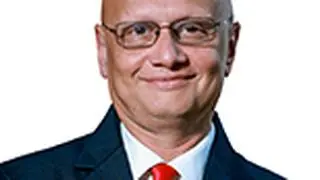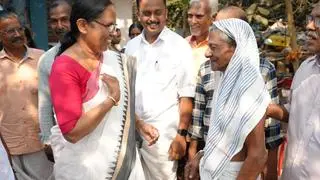Immediately after actor Rajinikanth announced his long-awaited decision to enter politics on the last day of 2017, a joke circulating on WhatsApp went like this: ‘Normal people party on December 31, but Rajini announces his own party’.
Rajinikanth’s announcement had sent his fans in Tamil Nadu into a tizzy. They were only upset that their ‘superstar’ had not announced the name of his party, and had asked them to desist from talking politics till he gave them the cue, or that they would have to wait till the next Assembly elections — due in normal course in 2021 — for Rajinikanth to test his political mettle. That there is need for an alternative to the two Dravidian parties — the DMK and the AIADMK — and the numerous other casteist and Tamil-chauvinist outfits is well accepted, but one who has entered politics has so far tried to change the discourse. Will Rajinikanth, who spoke of the moral decay in the State while announcing his political entry, be able to bring about a change?
Rajinikanth is not the first, and will also not be the last from the Tamil film industry to enter politics. In fact, Dravidian politics used the medium of cinema to make its ideological point — opposition to forward-caste Brahminical mores and support for rationalist thought — and obtain the support of the State’s film-crazy population.
The list of political leaders with connections to the film industry is long. M Karunanidhi, who was a script-writer, is a five-time Chief Minister. MG Ramachandran, or MGR, was a star attraction in the DMK’s public meetings before he broke away, formed his own party (AIADMK) and swept to power in 1977. His one-time heroine and protégé, J Jayalalithaa, took over the mantle of the party leadership after his death and was elected chief minister four times. MGR’s widow and small-time actor Janaki Ramachandran was chief minister for a brief while after the actor’s death.
Vijayakanth floated his own party (MDMK) and did well in the first Assembly election he contested before losing his way. There were others like actor Sivaji Ganesan, a disciple of late Congress leader and chief minister K Kamaraj, who too floated his own political outfit, only to come a cropper. Kamal Haasan too nurtures political ambitions and has been actively criticising the AIADMK government on Twitter, and raking up issues of corruption and government apathy.
Rajinikanth’s movies have the actor performing quirky mannerisms and mouthing ‘punch dialogues’ that enthral his fans. He had first hinted at entering politics in the mid-1990s, during Jayalalithaa’s first term as CM. One of his films then had him taking on a head-strong female actor, and coming up trumps. The message was loud and clear, but the ‘superstar’ disappointed his fans.
Why now?Tamil Nadu politics has been in flux for quite some time now, more so since the death of chief minister J Jayalalithaa in December 2016.
The ruling AIADMK is in a shambles, having just lost the by-election to the RK Nagar constituency, from where Jayalalithaa had been re-elected in 2016. Her death had caused huge upheavals in the party; it briefly lost its symbol to factional politics, till Chief Minister Edappadi K Palaniswami and his predecessor O Panneerselvam called truce and retrieved the ‘two leaves’. Despite that, the AIADMK’s candidate for the RK Nagar by-poll, former Minister E Madhusudanan, lost to TTV Dhinakaran, rebel faction leader and nephew of Jayalalithaa’s confidante Sasikala, who is now under incarceration in a Bengaluru jail for corruption.
The DMK hardly made a mark in the by-election with its candidate coming a distant third, prompting MK Alagiri, the elder son of Karunanidhi, to remark caustically that the party had no chance of winning under the current leadership. Alagiri was expelled from the DMK for anti-party activities, and his younger brother and rival, MK Stalin, is the party’s Working President.
An ageing Karunanidhi, an AIADMK without a charismatic leader, a still-to-be-successful Stalin, a Tamil Nadu where governance has suffered and where charges of corruption fly fast and thick, a young and vocal population that wants change from the crassness that passes off as political discourse — this is the milieu in which Rajinikanth has timed his entry. Those who know him well say Rajinikanth is a down-to-earth person, deeply spiritual, and believes in doing good. He will need the blessings of the gods and all his fans if he is to succeed in Tamil Nadu politics, which is completely different from the time MGR entered it in the 1970s.
The BJP’s national leadership has been actively wooing Rajini, given that the ruling party at the Centre hardly has a presence in the State. It is expected that the BJP will piggyback on Rajinikanth and hope to do well in the State, whenever elections are held.







Comments
Comments have to be in English, and in full sentences. They cannot be abusive or personal. Please abide by our community guidelines for posting your comments.
We have migrated to a new commenting platform. If you are already a registered user of TheHindu Businessline and logged in, you may continue to engage with our articles. If you do not have an account please register and login to post comments. Users can access their older comments by logging into their accounts on Vuukle.